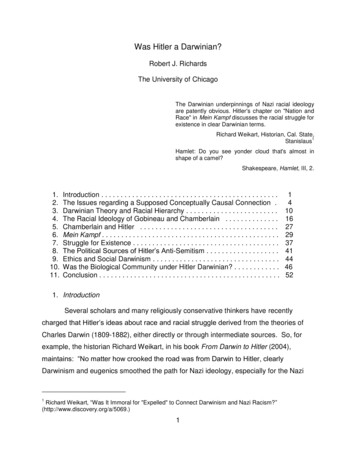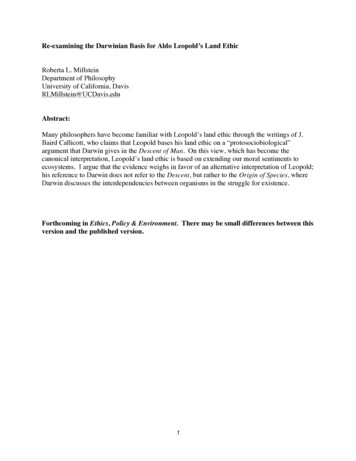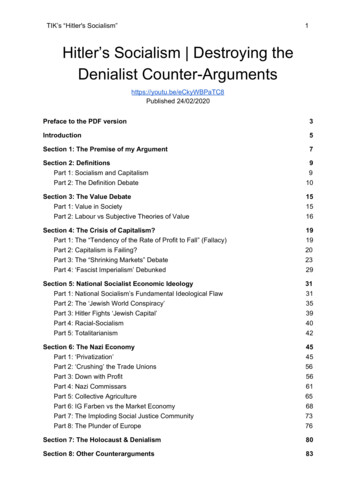
Transcription
Was Hitler a Darwinian?Robert J. RichardsThe University of ChicagoThe Darwinian underpinnings of Nazi racial ideologyare patently obvious. Hitler's chapter on "Nation andRace" in Mein Kampf discusses the racial struggle forexistence in clear Darwinian terms.Richard Weikart, Historian, Cal. State,1StanislausHamlet: Do you see yonder cloud that's almost inshape of a camel?Shakespeare, Hamlet, III, 2.1.2.3.4.5.6.7.8.9.10.11.Introduction . . . . . . . . . . . . . . . . . . . . . . . . . . . . . . . . . . . . . . . . . . . . . .The Issues regarding a Supposed Conceptually Causal Connection .Darwinian Theory and Racial Hierarchy . . . . . . . . . . . . . . . . . . . . . . . .The Racial Ideology of Gobineau and Chamberlain . . . . . . . . . . . . . .Chamberlain and Hitler . . . . . . . . . . . . . . . . . . . . . . . . . . . . . . . . . . . .Mein Kampf . . . . . . . . . . . . . . . . . . . . . . . . . . . . . . . . . . . . . . . . . . . . . .Struggle for Existence . . . . . . . . . . . . . . . . . . . . . . . . . . . . . . . . . . . . . .The Political Sources of Hitler’s Anti-Semitism . . . . . . . . . . . . . . . . . . .Ethics and Social Darwinism . . . . . . . . . . . . . . . . . . . . . . . . . . . . . . . . .Was the Biological Community under Hitler Darwinian? . . . . . . . . . . . .Conclusion . . . . . . . . . . . . . . . . . . . . . . . . . . . . . . . . . . . . . . . . . . . . . . .141016272937414446521. IntroductionSeveral scholars and many religiously conservative thinkers have recentlycharged that Hitler’s ideas about race and racial struggle derived from the theories ofCharles Darwin (1809-1882), either directly or through intermediate sources. So, forexample, the historian Richard Weikart, in his book From Darwin to Hitler (2004),maintains: “No matter how crooked the road was from Darwin to Hitler, clearlyDarwinism and eugenics smoothed the path for Nazi ideology, especially for the Nazi1Richard Weikart, “Was It Immoral for "Expelled" to Connect Darwinism and Nazi Racism?”(http://www.discovery.org/a/5069.)1
stress on expansion, war, racial struggle, and racial extermination.”2 In a subsequentbook, Hitler’s Ethic: The Nazi Pursuit of Evolutionary Progress (2009), Weikart arguesthat Darwin’s “evolutionary ethics drove him [Hitler] to engage in behavior that the restof us consider abominable.”3 Other critics have also attempted to forge a strong linkbetween Darwin’s theory and Hitler’s biological notions. In the 2008 film “Expelled,” adocumentary defense of Intelligent Design, the Princeton trained philosopher DavidBerlinski, in conversation with Weikart, confidently asserts: “If you open Mein Kampfand read it, especially if you can read it in German, the correspondence betweenDarwinian ideas and Nazi ideas just leaps from the page.”4 John Gray, formerprofessor at the London School of Economics, does allow that Hitler’s Darwinism was“vulgar.”5 Hannah Arendt also appears to have endorsed the connection when shedeclared: “Underlying the Nazis’ belief in race laws as the expression of the law ofnature in man, is Darwin’s idea of man as the product of a natural development whichdoes not necessarily stop with the present species of human being.”6 Put “Darwin” and“Hitler” in a search engine and several million hits will be returned, most from religiouslyand politically conservative websites, articles, and books.With the exception of the aforementioned, most scholars of Hitler’s reign don’targue for a strong link between Darwin’s biology and Hitler’s racism, but they will oftendeploy the vague concept of “social Darwinism” when characterizing Hitler’s racialideology.7 The very name of the concept—whatever its content—does suggest a link2Richard Weikart, From Darwin to Hitler: Evolutionary Ethics, Eugenics, and Racism in Germany (NewYork: Palgrave Macmillan, 2004), p. 6.3Richard Weikart, Hitler’s Ethic: The Nazi Pursuit of Evolutionary Progress (New York: PalgraveMacmillan, 2009), pp. 2-3.4“Expelled: No Intelligence Allowed” (2008), a documentary film directed by Nathan Frankowski andhosted by Ben Stein. The line by Berlinski comes sixty-four minutes into the film.5John Gray, “The Atheist Delusion,” The Guardian (15 March 2008): 4.6Hannah Arendt, The Origins of Totalitarianism (Orlando, Florida: Harcourt, [1948] 1994), p. 463.7Here are just a few of the more recent scholars who have described Hitler as a “social Darwinist”:Joachim Fest, Hitler, trans. Richard and Clara Winston. (New York: New York, Harcourt BraceJovanovich, 1974), pp. 54-56; Mike Hawkins, Social Darwinism in European and American Thought,1860-1945 (Cambridge: Cambridge University Press, 1997), pp. 277-78; David Welch, Hitler (London:Taylor & Francis, 1998 ) pp. 13-15; Frank McDonough, Hitler and the Rise of the Nazi Party (London:2
with evolutionary theory and particularly Darwin’s version of that theory. The supposedconnection between Darwin’s conceptions and Hitler’s is often traced via the biologicalideas of the English scientist’s German disciple and friend, Ernst Haeckel (1834-1919).In his book The Scientific Origins of National Socialism (1971), Daniel Gasmanclaimed: “Haeckel . . . was largely responsible for forging the bonds between academicscience and racism in Germany in the later decades of the nineteenth century.” 8 In alater book, Gasman urged that Haeckel had virtually begun the work of the Nazis:“ForHaeckel, the Jews were the original source of the decadence and morbidity of themodern world and he sought their immediate exclusion from contemporary life andsociety.”9 Gasman’s judgment received the imprimatur of Stephen Jay Gould, whoconcluded in his Ontogeny and Phylogeny (1977):But as Gasman argues, Haeckel’s greatest influence was, ultimately, inanother tragic direction—National Socialism. His evolutionary racism; hiscall to the German people for racial purity and unflinching devotion to a“just” state; his belief that harsh, inexorable laws of evolution ruled humancivilization and nature alike, conferring upon favored races the right todominate others; the irrational mysticism that had always stood in strangecommunion with his grave words about objective science—all contributedto the rise of Nazism.10Scholars like Gasman, Gould, Peter Bowler, Larry Arnhart—as well as a host ofothers—attempt to distinguish Haeckel’s views from Darwin’s, so as to exonerate thelatter while sacrificing the former to the presumption of a strong causal connection withPearson/Longman, 2003), p. 5; Richard Evans, The Coming of the Third Reich (New York: Penguin,2003), pp. 34-37; and Stephen Lee, Hitler and Nazi Germany (London: Rutledge, 2010), p. 94.8Daniel Gasman, The Scientific Origins of National Socialism: Social Darwinism in Ernst Haeckel and theGerman Monist League (New York: Science History Publications, 1971), p. 40.9Daniel Gasman, Haeckel’s Monism and the Birth of Fascist Ideology (New York: Peter Lang, 1998), p.26.10Stephen Jay Gould, Ontogeny and Phylogeny (Cambridge: Harvard University Press, 1977), pp. 7778.3
Hitler’s anti-Semitism.11 I don’t believe this effort to disengage Darwin from Haeckel canbe easily accomplished, since on central matters—descent of species, struggle forexistence, natural selection, inheritance of acquire characters, recapitulation theory,progressivism, hierarchy of races—no essential differences between master anddisciple exist.12 So if Hitler endorsed Haeckel’s evolutionary ideas, he thereby alsoendorsed Darwin’s.2. The Issues regarding a Supposed Conceptually Causal ConnectionThose critics who have urged a conceptually causal connection betweenDarwin’s or Haeckel’s biology and Hitler’s racial beliefs—Weikart, Berlinski, and amyriad of religiously and politically constricted thinkers—apparently intend to underminethe validity of Darwinian evolutionary theory and by regressive implication morally indictDarwin and Darwinians like Ernst Haeckel. More reputable scholars—Gould, Arnhart,Bowler, and numerous others—are willing to offer up Haeckel to save Darwin byclaiming significant differences between their views, a claim, as I’ve suggested, thatcannot be sustained. The arguments arrayed against Darwin and Haeckel have power,no doubt. Whether they should have power is the question I would like to investigate.Two salient issues arise out of the allegations of a connection between Darwiniantheory and Hitler’s racial conceptions: first, the factual truth of the claimed causalconnections; and second, the epistemic and moral logic that draws implications from thesupposed connections. The factual question can be considered at four levels. Thesedistinctions may seem tedious to the impatient; but they are necessary, since the factualclaim is often settled by even talented scholars through the deployment of a few vagueobservations. First, there is the epistemological problem of the very meaning of theassertion of causal connections among ideas. This issue falls under the rubric of11See Peter Bowler, The Non-Darwinian Revolution (Baltimore: Johns Hopkins University Press, 1988),pp. 83-84; and Larry Arnhart, Darwinian Conservatism (Charlottesville, Va.: Imprint Academic, 2005), p.116.12I have shown the essential identity of Darwin’s and Haeckel’s evolutionary theories at some length inRobert J. Richards, The Tragic Sense of Life: Ernst Haeckel and the Struggle over Evolutionary Thought(Chicago, University of Chicago Press, 2008), pp. 135-62.4
influence, that is, one individual’s ideas influencing or having causal impact on those ofanother. A host of acute epistemological problems attend the conception of influence(ideas, after all, are not like billiard balls), but I will bracket them in this discussion andsimply assume that influence is real and causally potent. The second level of thefactual question is: Did Hitler embrace Darwinian theory? Third, did any supposedendorsement actually lead to his racial policies, especially concerning the treatment ofJews? Finally, we should consider the beliefs and attitudes of those scientists workingdirectly under the authority of the Nazi party: Did they adopt Darwinian theory and onthat basis urge the inferiority of Jews and recommend eugenic measures? I willconsider each of these latter three levels of the factual question in turn.There is a kind of pseudo-historical game that can be played with causalinfluence, a distraction that will vitiate a serious attempt to deal with the second andthird levels of the factual question. Instead of tracing out a reputed serious engagementof Hitler with Darwin’s ideas and making an effort to determine how those ideas mighthave actually motivated him, one could play something like “six degrees of CharlesDarwin.” That is, one could catch Hitler using, say, a certain phrase he picked up fromsomeone whom he read, who in turn read someone else who used the phrase, whofound it in a journal article that mentioned someone quoting Darwin, etc. Virtually anyremarks made by Hitler could thus be traced back to Darwin—or to Aristotle or to Christ.The real issue would be whether the phrase had Darwinian ideas behind it and whethersuch usage by Hitler motivated his actions.Attendant on the factual question is that of the meaning of “Social Darwinism”when applied to Hitler and other Nazis. The term is maddenly opaque, but we candiscriminate several different notes that conventionally fall under the conception andthen decide which of those notes apply to the Nazis, Hitler in particular.The strategy of those attempting to show a causal link between Darwin’s theoryand Hitlerian ideas about race runs, I believe, like this: the causal relation proceedingfrom Darwin to future Nazi malevolence justifies regressive epistemic and moraljudgments running from future to past, thus indicting Darwin and individuals like Haeckelwith moral responsibility for the crimes of Hitler and his minions and thereby5
undermining evolutionary theory. Now the validity of this kind of moral logic might bedealt with straightaway: even if Hitler had the Origin of Species as his bedtime readingand clearly derived inspiration from it, this would have no bearing on the truth ofDarwin’s theory or directly on the moral character of Darwin and other Darwinians.Mendelian genetics became ubiquitous as a scientific foundation for Nazi eugenic policy(and American eugenic proposals as well), though none of the critics question the basicvalidity of that genetic theory or impugn Mendel’s moral integrity. Presumably Hitler andother party officials recognized chemistry as a science and utilized its principles toexterminate efficiently millions of people. But this hardly precludes the truth of chemicaltheory or morally taints all chemists. It can only be rampant ideological confusion tomaintain that the alleged connection between Hitler’s ideas and those of Darwin andHaeckel, ipso facto, nullifies the truth of evolutionary theory or renders theseevolutionists, both long dead before the rise of the Nazis, morally responsible for theHolocaust.Had Hitler and leading Nazi biologists adopted Darwianian theory, exactly whatfeature of the theory would supposedly have induced them to engage in morallydespicable acts? Weikart, for one, asserts it’s Darwinian materialism that “undercutJudeo-Christian ethics and the right to life.”13 This charge has three salient problems.First, strictly speaking, Darwin was not a materialist; when the Origin was published hewas a theist.14 The leading Darwinian in Germany in the late nineteenth century, ErnstHaeckel, rejected the charge of materialism; he was a convinced Goethean monist (i.e.,all organisms had a material side and a mental side). But it’s true, Darwin and Haeckelwere perceived as materialists by later critics—and by historians like Weikart. Second,as I’ll indicate in a moment, Darwin’s own moral theory certainly did not abandon JudeoChristian precepts. Nor did Haeckel’s. Haeckel was quite clear. He accepted the usualmoral canon: “Doubtless, human culture today owes the greater part of its perfection to13Richard Weikart, “Darwinism and Death: Devaluing Human Life in Germany 1859-1920,” Journal of theHistory of Ideas 63 (20020, pp. 323-344 (quotation from p. 343).14Charles Darwin, The Autobiography of Charles Darwin, 1809–1882, ed. Nora Barlow (New York:Norton 1969), pp. 92-3. Only in the mid 1860s does Darwin’s theism slip away; he constructed his theoryas a theist.6
the spread and ennobling effect of Christian ethics.”15 Haeckel, like Darwin, ratherthought that Christian precepts had a source other than Divine command; those normsderived from the altruism bred in the bone by natural selection.16But the chief reasonwhy presumptive Darwinian materialism cannot be the source of the unique malignity ofHitler and leading Nazi biologists is simple: they were not materialists. As I will showbelow, Hitler’s gauzy mystical attitude about Deutschtum was hardly materialistic;moreover, leading Nazi biologists rejected Darwin and Haeckel precisely because theythought the theories of these two scientists were materialistic while volkisch biology wasnot. In the first instance, it is crushingly naïve to believe an extremely abstractmetaphysical position alone can produce morally deleterious or virtuous behavior. Inthis instance, though, whether abstract ethereal belief or not, Darwinian materialismcannot be the root of any malign influence perpetrated on the Nazis. Below I willdescribe the character of the more rarified metaphysics of Nazi scientists. Anotherconsideration further attenuates the gossamer logic of the arguments mounted byWeikart, Berlinski, Gasman, Gould, and members of the Intelligent Design crowd:namely that their exclusive focus on the supposed Darwin-Hitler or Haeckel-Hitlerconnection reduces the complex motivations of the Nazi leaders to linear simplicity.These critics ignore the economic, political, and social forces operative in Germany inthe 1930s; and they give no due weight to the deeply rooted anti-Semitism that ran backto Luther and Medieval Christianity and forward to the religious and political sentiments15Ernst Haeckel, Der Monismus als Band zwischen Religion und Wissenschaft (Bonn: Emil Strauss,1892), p. 29.16I have discussed Haeckel’s ethical position in The Tragic Sense of Life: Ernst Haeckel and theStruggle over Evolutionary Thought (Chicago: University of Chicago Press, 2008), pp. 352-54,7
rife at the end of the nineteenth century.17 The names of those who prepared theground before Hitler entered the scene go unmentioned: the court preacher andfounder of the Christian Socialist Party, Adolf Stöcker (1835-1909), who thought theJews threated the life-spirit of Germany;18 Wilhelm Marr (1819-1904), founder of theLeague of Anti-Semitism, who maintained that the Jews were in a cultural “struggle forexistence” with the spirit of Germanism, taking overthe press, the arts, and industrial production;19 orthe widely-read historian Heinrich von Treitschke(1834-1896), who salted his historical fields withanimadversions about alien Jewish influences onGerman life and provided the Nazi’s with thebywords: “the Jews are our misfortune.”20 Thenthere was the composer Richard Wagner (18131883), whose music Hitler adored, even as a youngman attending countless performances of TheFlying Dutchman, Parsifal, Lohengrin, and the Ringcycle, and as rising political leader visiting theFigure 1: Richard Wagner (1871). Photomaestro’s home in Bayreuth at the invitation of theby Franz Hanfstaengl.Wagner family. In 1850 Wagner composed a smallpamphlet, which he reissued and expanded in17Richard Evans discusses this mix of religious and political anti-Semitism at the end of the nineteenthcentury in his The Coming of the Third Reich, pp. 22-34.18See, for example, Adolf Stöcker, Das modern Judenthum in Deutschland besonders in Berlin (Berlin:Verlag von Wiegandt und Grieben, 1880), p. 4: “the entire misery of Germany, I should have mentioned,comes from the Jews.”19See Wilhelm Marr’s Der Sieg des Judenthums über das Germanenthum, vom nicht confessionellenthStandpunkt aus betrachtet, 8 ed. (Bern: Rudolph Costenoble, 1879). He held that “the degradation ofthe German state to the advantage of Jewish interests is a goal pursued everywhere. The daily press ischiefly in Jewish hands and they have made a speculative and industrial matter out of journalism, abusiness forming public opinion—theater criticism, art criticism are three-quarters in Jewish hands. . .There is no ‘struggle for existence,’ except that Judaism gathers its advantage” (pp. 24 and 27).20Heinrich von Treitschke, Ein Wort über unser Judenthum (Berlin: G. Reimer, 1880), p. 4: “. . . ertönt esheute wie aus einem Munde: “die Juden sind unser Unglück!”8
1869, entitled Das Judenthum in der Musik (Jewishness in music).21 He wished “toexplain the involuntary revulsion we have for the personality and nature of the Jews andto justify this instinctive repugnance, which we clearly recognize and which is strongerand more overwhelming than our conscious effort to rid ourselves of it.”22 These areonly a few of the intellectuals—or near-intellectuals—who expressed unreflective tomore consciously aggressive anti-Semitic attitudes at the turn of the century; theirmalign depictions and vicious rants cascaded through German intellectual society in theearly years of the twentieth century. Of course, these attitudes were not confined toGermany, but invaded distant shores as well. The new American ambassador toGermany in 1933, William E. Dodd (1869-1940), former chair of the history departmentat my university, could, for example, discount the outrageous attacks on Jews in Berlinby SA troops with the causal remark to a Nazi official that “we have had difficulty nowand then in the United States with Jews who had gotten too much of a hold on certaindepartments of intellectual and business life.” 23 Dodd finally did come to appreciatethat the Nazi treatment of Jews went beyond the bounds of “civilized” ante-Semitism,and he became an early voice of warning about the intentions of Hitler’s government.The disposition of Dodd and the others I have just mentioned were innocent of anyconcern with Darwin’s theory. Finally, one needs consider the politicians, especially inVienna, who used anti-Semitism in opportunistic ways. I will examine the views of theselatter more particularly below, since Hitler himself ascribed his racial attitudes to thissource. The critics of Darwin and Haeckel have in their indictments neglected thevarious complex social and cultural forces that fueled the anti-Semitic obsessions ofHitler and his henchmen. The critics have sought, rather, to discover a unique key toNazi evil.2421Richard Wagner, Das Judenthum in der Musik (Leipzig: Weber, 1869).22Ibid., pp. 10-11.23Quoted by Erik Larson, In the Garden of Beasts (New York: Crown Books, 2011), p. 130.24Despite the caveats I’ve offered about the easy slide from causal influence to epistemic and moralindictment, I don’t want to deny that under certain well-defined circumstances one might justify, forinstance, a morally negative assessment based on a relationship of conceptual influence. I haveanalyzed those circumstances in Robert J. Richards, “The Moral Grammar of Narratives in History of9
The presumption that a factual connection between Darwin’s Origin of Speciesand Hitler’s Mein Kampf morally indicts Darwin and somehow undermines evolutionarytheory rests, quite obviously, on defective moral and epistemic logic—rather, on no logicat all. Nonetheless, I will put aside this logical consideration for the moment toinvestigate the supposed factual linkage.3. Darwinian Theory and Racial HierarchyThe first factual issue to tackle is: Did Hitler embrace Darwinian theory? Thequestion, however, needs to be made more exact: What features of Darwin’s theory didhe embrace, if any? Concerning the theory, especially as applied to human beings, wecan discriminate three central components: 1) that human groups can be arranged in aracial hierarchy from less advanced to more advanced; 2) that species have undergonedescent with modification over vast stretches of time and that human beings descendedfrom ape-like ancestors; and 3) that natural selection is the principal device to explainspecies transitions. Now the questions become: Did Hitler adopt any of thesepositions, and were they derived ultimately from Darwin? And did these ideas causehim to adopt or favor racist and specifically anti-Semitic views characteristic of Nazibiology? Of course, a positive answer to this latter question is essential to complete thecausal connection between Darwinian theory and Hitler’s lethal racial attitudes.The first component of Darwinian theory to consider is that of racial hierarchy.Gould has argued that Darwin’s theory was not progressivist, and therefore it did notsituate species and races, particularly the human races, in any hierarchical scheme. Hemaintained, for example, that “an explicit denial of innate progression is the mostcharacteristic feature separating Darwin’s theory of natural selection from othernineteenth century evolutionary theories.”25 Lamarck, by contrast, had postulated anBiology—the Case of Haeckel and Nazi Biology,” Cambridge Companion to the Philosophy of Biology ,ed. Michael Ruse and David Hull (Cambridge: Cambridge University Press, 2007), pp. 429-52.25Stephen Jay Gould, “Eternal Metaphors of Palaeontology,” Patterns of Evolution as Illustrated in theFossil Record, ed. A. Hallan (New york: Elsevier, 1977), pp. 1-26 (quotation from p. 13). Gouldsubsequently tried to distinguish between what Darwin’s theory demands and what his culturaldispositions might have led him to assert—as if Darwin’s theory were not embedded in the words of hisbooks. See Stephen Jay Gould, Wonderful Life: The Burgess Shale and the Nature of History (New10
internal, quasi-hydraulic mechanism, that produced progressively more complexspecies over time. And Haeckel, quite graphically, arranged the human groups in ahierarchical scheme. Though other scholars have followed Gould’s lead,26 it’s quiteclear that Darwin thought of natural selection as a kind of external force that wouldgenerally produce, over vast stretches of time, more progressively developedorganisms. In the penultimate paragraph of the Origin of Species, he explicitly statedhis view: “And as natural selection works solely by and for the good of each being, allcorporeal and mental endowments will tend to progress toward perfection.”27 Evenbefore he formulated his theory, however, Darwin was disposed to regard certain racesas morally and intellectually inferior, as for example, the Fuegian Indians heencountered on the Beagle voyage. His later theoretical formulations and his owncultural assumptions surely reinforced each other. In the Descent of Man, Darwindescribed the races as forming an obvious hierarchy of intelligence and moral capacity,from savage to civilized, with the “intellectual and social faculties” of the lower racescomparable to those that must have characterized ancient European man.28Accordingly, he ventured that “the grade of their civilisation seems to be a mostimportant element in the success of competing nations,”29 which explained for him theextermination of the Tasmanians and the severe decline in population of theAustralians, Hawaiians, and Maoris. Those groups succumbed in the struggle with moreadvanced peoples.30 So, despite some scholars’ views to the contrary, it’s clear thatYork: Morton, 1989), pp. 257-58. I have discussed Darwin’s progressivism vis-à-vis the assertions ofGould, Peter Bowler, and Michael Ruse. See Robert J. Richards, “The Epistemology of HistoricalInterpretation,” in Biology and Epistemology, eds. Richard Creath and Jane Maienschein (Cambridge:Cambridge University Press, 2000), pp. 64-90.26See, for example, Peter Bowler, Theories of Human Evolution (Baltimore: Johns Hopkins UniversityPress, 1986), p. 13.27Charles Darwin, On the Origin of Species (London: Murray, 1859), p. 489.28Charles Darwin, The Descent of Man and Selection in Relation to Sex, 2 vols. (London: Murray, 1871),1: 34.29Ibid., p. 239.30In the second edition of the Descent, Darwin described the extinction of the Tasmanians and thedecline of the other “primitive” races of the South Pacific. See, Charles Darwin, The Descent of Man andSelection in Relation to Sex, with an introduction by James Moore and Adrian Desmond (London:Penguin Group, [1879] 2004), pp. 211-22.11
Darwin’s progressivist theory entailed a hierarchy of the human races. His opposition toslavery, which was deeply felt, did not mitigate his racial evaluations.31Darwin’s racialism never included Jews. His few scattered references to Jewscontain nothing derogatory. Of some interest, though, he did observe that Jews andAryans were quite similar in features, due, he supposed, to “the Aryan branches havinglargely crossed during their wide diffusion by various indigenous tribes.”32 This is insome contrast with Hitler, for whom the Jews and Aryans were pure (i.e., unmixed)races—a matter discussed below. Haeckel, however, does include Jews in hishierarchical scheme.In the first edition of his Natürliche Schöpfungsgeschichte (Natural history ofcreation,1868), Haeckel represented in a tree-diagram nine species of human beings,along with their various races, all stemming from the Affenmensch, or ape-man. Thevertical axis of the diagram was meant to suggest progressive development inintelligence and moral character (see fig. 2); it showed Australians, Hottentots, andPapuans at the lowest branches, with Caucasians occupying the highest. Notsurprisingly, perhaps, the German and Mediterranean races of the Caucasian species(upper right in the diagram) are leading the other groups—except, that is, for theBerbers and the Jews, two other branches of the same species. Haeckel located theJews at the same evolutionary level as the Germans and other Europeans—hardly thekind of judgment expected of a supposed anti-Semite. 3331Adrian Desmond and James Moore maintain that Darwin’s anti-slavery attitude led him to postulatespecies descent from a common ancestor, and thus establish the brotherhood of man. I am notconvinced by the thesis; but even if true, this does not contradict his notion of racial hierarchy. Christianslave-holders in the American South likewise assumed common ancestry for human beings. See theirDarwin’s Sacred Cause (New York: Houghton Mifflin Harcourt, 2009), and Robert J. Richards, “TheDescent of Man: Review of Darwin’s Sacred Cause,” American Scientist 97 (September-October, 2009):415-17.32Darwin, Descent of Man (1871), 1: 240.33Ernst Haeckel, Natürliche Schöpfungsgeschichte (Berlin: Georg Reimer, 1868), p. 519. In subsequenteditions, Haeckel added more species and changed the location of the races in the hierarchy. In thesecond edition, for instance, Jews are located just a bit below the level of the Germans, but still remain farahead of most of the other races.12
Haeckel spoke directly to thequestion of anti-Semitism. He, alongwith some forty other Europeanintellectuals and artists, wasinterviewed in the early 1890s about thephenomenon of anti-Semitism byHermann Bahr (1863-1934), a journalistand avant-garde playwright. Haeckelmentioned that some of his studentswere anti-Semites but he explicitlydisavowed that prejudice. He didacknowledge that some nations,including Germany, were judicious inbarring the immigration of Slavic Jewssince they would not adopt the customsof their new countries but remainedstubbornly unassimilated. He yetcelebrated the gebildeten Juden ofGermany. He is quoted by Bahr asproclaiming:Figure 2: Stem-Tree of Human Species. From ErnstHaeckel, Nattürliche Schöpfungsgeschichte (1868).I hold these refined and noble Jews tobe important elements in Germanculture. One should not forget that they have always stood bravely forenlightenment and freedom against the forces of reaction, inexhaustibleopponents, as often as needed, against the ob
Berlinski, in conversation with Weikart, confidently asserts: “If you open Mein Kampf and read it, especially if you can read it in German, the correspondence between Darwinian ideas and Nazi ideas just leaps from the page.”4 John Gray, former professor at the London Sc










